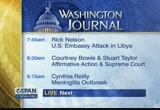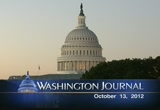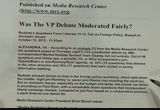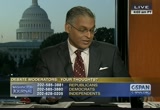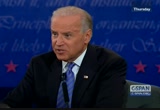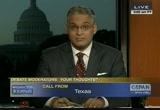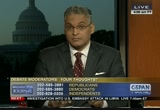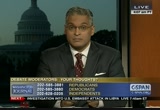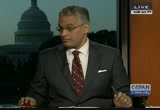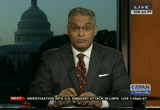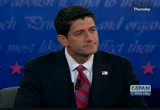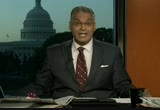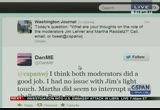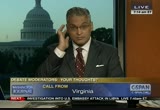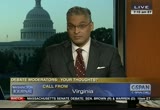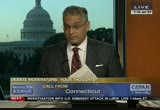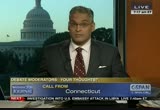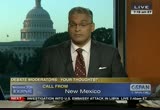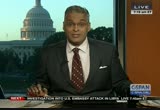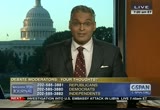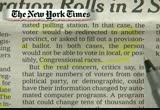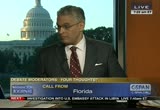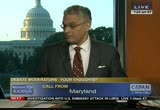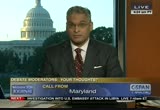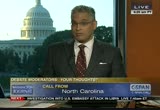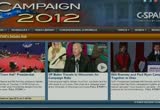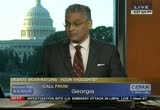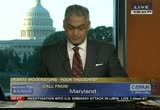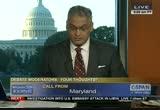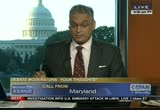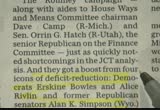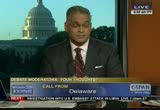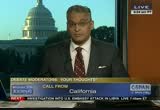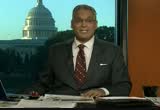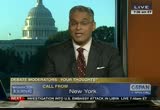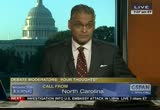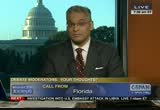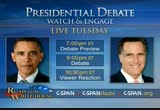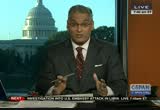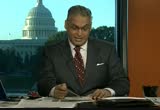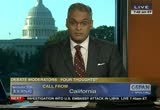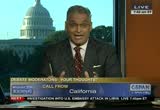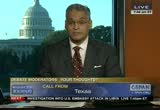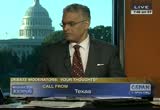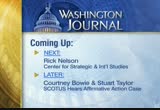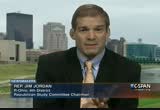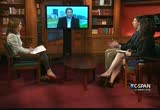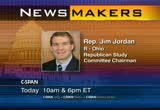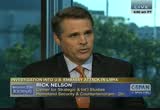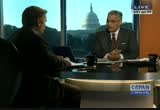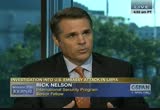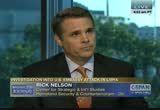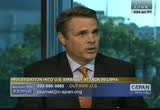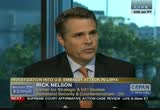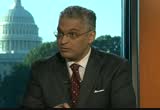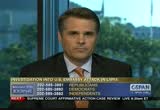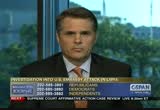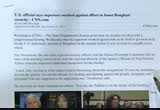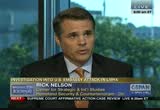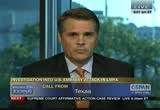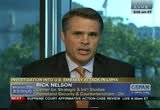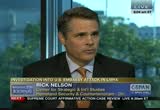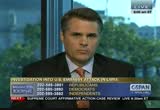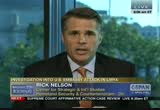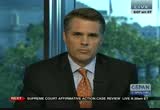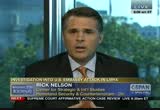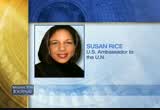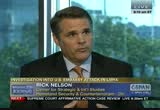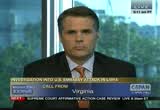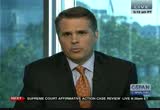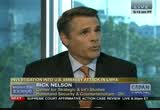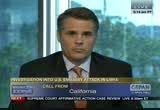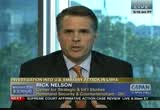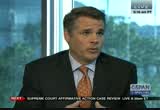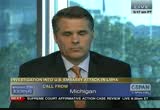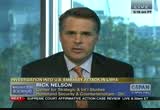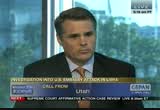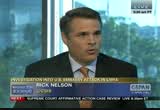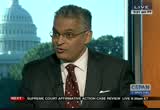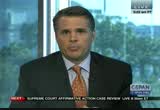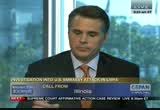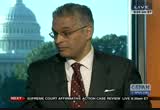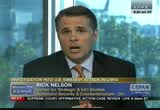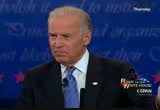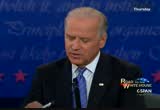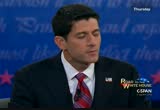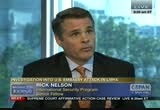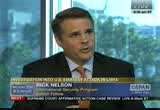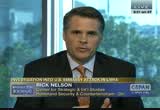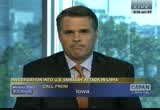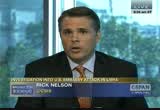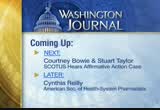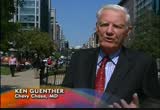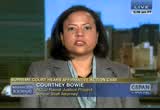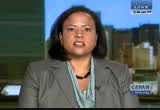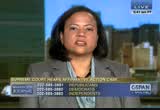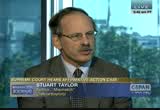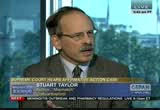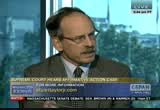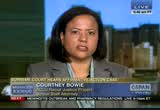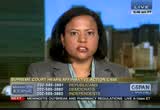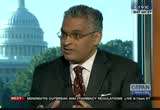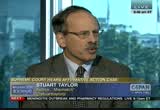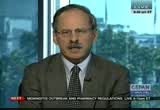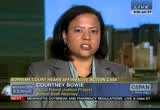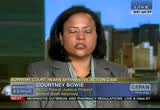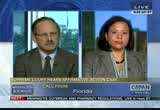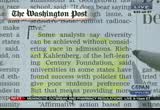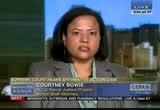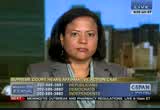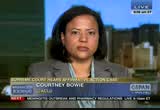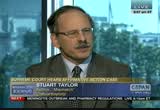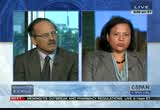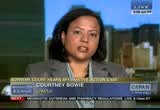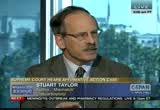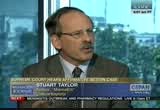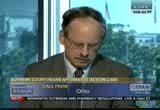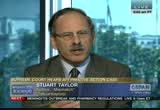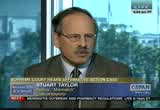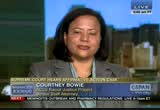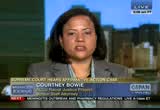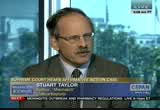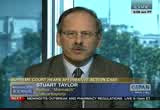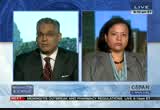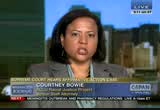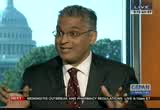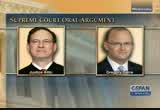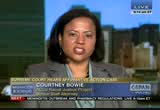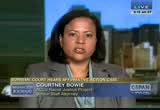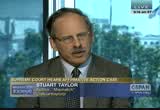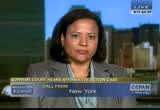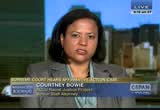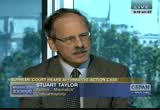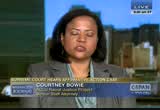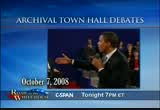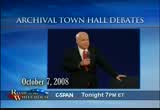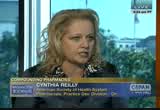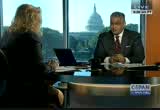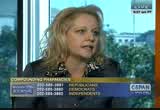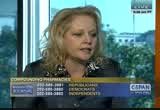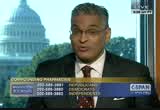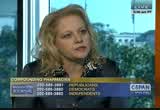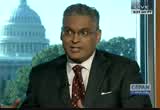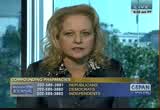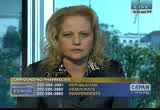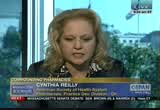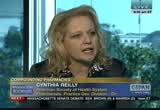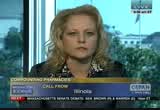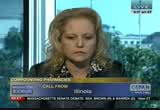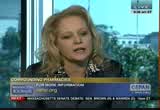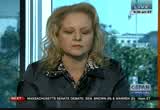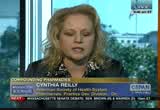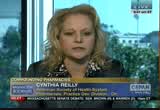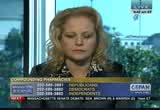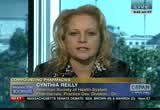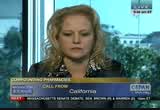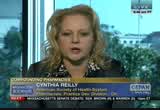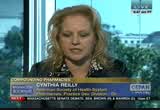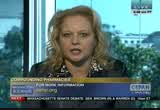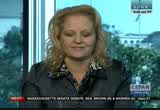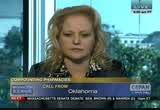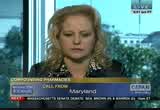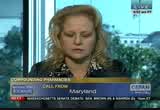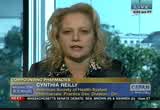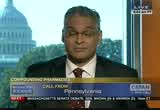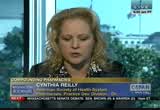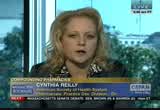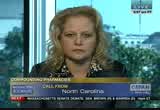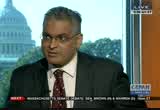tv Washington Journal CSPAN October 13, 2012 7:00am-10:00am EDT
7:00 am
we are joined by staff attorney courtney bowie and stuart tayl or. and a look at the recent outbreaks on. host: a poll shows a one point advantage for mitt romney. the washington post talks but adds fanning in critical states with the front page story, 100 million spent so far by the two candidates in florida, about the
7:01 am
same spent in virginia and ohio. mitt romney makes two stops in ohio. obama prepares for the next debate on tuesday. town hall style format. you can see previous town hall formats tonight on c-span. that will start at 7:00 p.m., go to c-span.org for details. and for the first 45 minutes, we wanted to get your thoughts and the role of the moderator during the debate. we have pondered two already. we want to get your thoughts on style.and jim's anything that involves the moderator during the presidential debates. we want to get your thoughts. give us a call --
7:02 am
we choose this in part because of the reactions in the debate moderator's, especially from groups and watch these kinds of things. this is media matters, this out for the mark but debate. this is what the poston. write when media uses interruptions -- it goes on despite right-wing media are attacking the moderator, and planning she interrupted paul ryan significantly more than joe biden. in fact she enter. joe biden the same amount of times. she interrupted them an equal number. and then they show a bar graph. that is from media matters for america. another group that watches america.
7:03 am
and this is their response from the debate. she showed up almost no debate in her foreign policy debate questions. but on domestic issues, especially on the budget, with a remarkable dozen questions that inc. liberal campaign themes, compared to just four based on the conservative promise. but from the media research center. just two groups of watch the media and in dealings about this campaign season. and tailoring to the moderators, which we bring it to you. we want to get your thoughts on the moderators and what you think about of them feared it you want to give us a call, the numbers are on the screen.
7:04 am
just to give you a flavor of a little bit from this past debates that we saw this week here is martha. is during the bursting at the vice presidential debate. she is challenging joe biden. >> let me go back to the surge troops. and you brought this up, congressman paul ryan. i talked to senior officers who were concerned that the troops were pulled out during the fighting season, and some of them saw that as a political move. can you tell me, joe biden, what was the daughter reason for bringing the troops home? >> the reason -- when the president announced the surge, you will remember, he said the surge will be out by the end of the summer. the military said the surge will be out. nothing political about this. before the surge occurred, and
7:05 am
you will be straight with me to, before the surge occurred we said there would be out by the end of the summer, that is what the military said. reason for that is -- >> the military follows orders. >> there are people that are concerned. but not the joint chiefs. that was the recommendation in the oval office to the president of united states of america. i sat there. i am sure you will find someone who disagrees with the pentagon. i am positive you will find that within the military. that is not the case here. host: does one of the several clips we will show you during the first 45 minutes. but your thoughts on the roles of the moderator. let us start with a tweet. he says -- in both debates but moderators acted as a big lead democrats are good and republicans can sometimes be good, maybe. here is a call on the democrat's line. from texas, arleen.
7:06 am
caller: the first one was not so good. the lady thursday night i think was good, but she was more on foreign policy -- i wished there would have been more on the economy and jobs. that is what you are looking for? caller: yes. and i think joe biden did a great job. host: what about martha raddatz 's style? caller: they did not go overboard. like the first debate. she kind of maintained it very well. host: on our line for republicans, walter, from indiana. caller: good morning. i do not know what the first color was watching. it was a circus. she of no control whatsoever.
7:07 am
i find it interesting that all five people that are going to the question and answers for these presidential debates, none of them are conservative, none of them are republicans. so i already have my defense up, my guard up, singing, watching this. what they should do is have a mixture of a few republicans, conservatives, democrats. but to have control of the debate and to what joe biden -- he looked like he was off of his medication with his facial expressions and rude interruptions. i think they need a debater that will be fair and balanced on either side, that takes control of the issues and says cannot stop interrupting. and it was a circus. it was a sham to watch the vice president looking so on handled. host: hoodie think should sit in the chair? caller: i would do this.
7:08 am
five debates, if you take two conservatives were afraid, and the next time two democrats, and three of the other. host: there are four actually. caller: i would love bill o'reilly. he allows both sides to speak. i would have somebody like bill o'reilly. it is not really far right. and maybe like a lou dobbs. and you can have a couple leftys. but they have to allow the contestants to finish a statement without being rudely interrupted. it was a circus. host: winter haven, fla., on our line for democrats. caller: you talk about the
7:09 am
moderators. the only reason this is on the table is because paul ryan did not have a grasp on the debate the other night. you consider the first question asked about foreign policy. i sat there and i watched the debate. paul ryan did not have a clue as to what joe biden was saying. when he was talking about is that you are going to get the surge groups out of my -- afghanistan and are going to replace them with afghan troops that are trained. he did not understand that. so everybody wants to look at joe biden being on the hinge. but paul ryan was out of his lead. he did not understand the question purity did not get the concept that if you are born to take soldiers out of afghanistan, you are going to replace them with afghan
7:10 am
soldiers better trained to replace them. host: there were several laehr.sms of the gym whe jim caller: you are going to have the back and forth. cannot sit there and control it the entire situation. taking questions, i have never seen a debate where you have two candidates were both of them are sitting there reading the debates were fine, the moderator's did their job, they will let people talk. you cannot blame the moderator. >> here is paul ryan on thursday, responding to a question about afghanistan from martha. >> i want to ask you about the -- be romney campaigned talks
7:11 am
about no apologies. should the united states have apologized for americans burning acrons? should apologize for the united states marines urinating on corpses? >> yes. what we should not be apologizing for are standing up for our policies. host: again, just a sampling of your thoughts on the role of the moderator for our first 45 minutes. do not forget, it is the next debate -- the next debate is to stick your deepens that live on c-span your watch and engage during the course of the debate. our programming will include a 7:00 p.m. debate preview. at 9:00 p.m. the debate. your reactions at 10:30. the presidential debate, a town hall style.
7:12 am
live to stickered see it on c- span, wasn't on c-span radio. you can catch it on c-span.org. detroit, michigan. on our line for democrats, michele. caller: good morning. i have a couple of points of like to make your firstly, i watched both debates. the presidential as well as the vice-presidential debate. and one of the things i noticed was the second debate -- the republicans are complaining about is the way vice-president joe biden conducted himself. i do not think vice-president biden did anything any differently than the way the republican nominee mr. romney
7:13 am
did. people talked about how president obama made faces when mr. romney spoke. but mr. romney interjected himself and a number of times until the moderator what he was going to do. host: so they focus on the moderator and a performance so far. caller: i did not think that the first moderator. a stand up job. he allowed mr. romney to take over his job. but what i will say the young lady moderator did with the vice presidential debate, i think she did a great job. she did far better. host: because why? caller: because she allowed them to speak, which was able to go in and stop them and get them 1.2. each of them the opportunity to meet. the opportunity to say what it
7:14 am
was that they wanted to do. host: this is dan on twitter. i think both moderator's did a good job. martha did seem to interrupt and challenge ryan more. next up is clinton veered clinton joins us from virginia on our republican line. caller: good morning. i was in the other room and have the volume turned up loudly. take and the entire debate. and i had a hard time in the initial stages of it telling if martha was on the side of the republicans or democrats. i thought she was -- they brought in a third party that was arguing for the democrats.
7:15 am
to me she was very biased, initially. and, again, the term moderator -- she is supposed to take an active role in moderating what is said. and it seems as one of the other callers mentioned, it was more like watching a circus. host: is there an ideal moderator in your mind? someone you would like to see moderate these debates? caller: you have to go back to the 1970's to find someone who is impartial. today it seems that every one
7:16 am
has an overstatement -- that is an overstatement. but ones that i have seen, of course everyone has an opinion, and that is going to be difficult for me to take a specific one. host: that as clinton from virginia. when we go to the campaign, stories about ads. the washington post says obama and romney had gone up and down in the florida polls, but the president posting stronger numbers are for the denver debate, but romney gaining since. the two sides have spent more than $100 million on ads and the state. with a slight advantage to republicans. florida is followed closely and combined spending by virginia, ohio and north carolina. edmund joins us from connecticut.
7:17 am
caller: thank you for taking my call. this is really strange. both gentlemen did well. but the facts -- the moderator -- these two men were talking. i do not think that she can't stop that -- she did well by saying, please stop. so i do not see why the other side are talking about -- our buyers president of united states is -- it is absurd. we need to respect the presidency. because, to me, i believe that we do not do this well, we are always bashing the folks. i do not think that will go
7:18 am
well. mr. joe biden -- he was laughing because i think he did not know the facts. if paul ryan would say something, he was laughing. there they go again. host: betty from new mexico joins us. we are talking about the role of the moderator. what you think? caller: i thought the first debate was really a non-debate here about it was very poorly handled by jim lehrer. mitt romney basically took over, shot and over him at one point. that was beyond rude to me, to treat the moderator that way. and i sensed, not too many hardball questions, more like a softball game. on the flip side, i thought martha raddatz handled everything beautifully. she is a consummate pro. and she knows what is going on
7:19 am
out of there. i thought her questions were pointed. i can see where the republicans would be upset. because paul ryan did come off as somebody who really was not all that knowledgeable. let us face it, the romney-ride ticket has absolutely 0 no for foreign policy experience. host: are you surprised that a lot of the debate to up foreign policy questions? caller: and over. i am absolutely decided. host: even over questions of the economy? caller: yes. to be honest with you, i think they are on an equal bar. and vice-president biden, that is where he shined. this man knows his stuff and that is why he was positioned the way he was. over the economy -- we wouldn't have problems with the economy if the republicans hadn't been
7:20 am
so obstructionist. host: the caller brought up jim lehrer from the debate that took place on october 3. here is a bit of it. >> excuse me, sir. we barely have three minutes left. i am not want to say have been too long or i have done a poor job. >> you of that a great job. >> but the role of government and -- we have lost a pot. we only have three minutes left. in the debate before we go to your closing statements. so i want to ask finally here, and remember, we of the three minutes total time. host: again, we are asking you about the role of the moderator. the numbers are on your screen. all starting with 202. or you can tell us your thoughts on facebook or twitter.
7:21 am
you can get your thoughts on what the next moderator should do. you can offer your ideal moderator. this is the chance to do so. this will be until 7:45. . new york times has the story looking at border abilities and boater registrations. specifically in two states. and the last five years, maryland and washington state of setup voter registration systems that make it easier for people to register to vote. of in that case, the voter could be redirected to another
7:22 am
precinct, or asked to fought a provisional ballots. you can read that full story and the new york times today. florida, thank you for waiting, on our line for republicans, mary. i wanted to make a comment about martha raddatz, i really like her. i had been following her. she is wonderful. as far as a moderating, she really did not do a good job to control joe biden. he was completely -- he was intent on throwing off paul ryan. paul ryan is itself controlled person. i cannot believe -- he seemed like a child. was laughing. he is the vice president of the united states feared that is not how you really conduct yourself. host: what could the moderator
7:23 am
of changed about that? said, lete could've us change the subject. he kept interrupting over and over. i think paul ryan was not trying to catch the bite. i think his intent of biden was to really throw him off. not because he is very knowledgeable, because i think is not very knowledgeable. i think paul ryan kept on the subject, he kept answering the questions. that is what americans want to hear, we want to hear him -- we do not want to hear him putting him down. it is disrespectful. host: that is mary from florida. on twitter -- collars and tweets i am seeing think moderators are only good if they perceive they lean their way. caller: good morning.
7:24 am
i am feeling great. i really enjoy the second debate. the moderators so far -- the lives that -- romney and paul ryan both lied the entire debate. jim lehrer allowed them to lie. this young lady cut them off. she was correct to say, excuse me, can you be specific? and to be called out like that, a liar -- supporters cannot accept that. if the next moderator's allow the filibuster by the lying mitt romney, or even of the president goes on to a tangent that is totally false, i think that i
7:25 am
would expect -- and is not born to happen because i do not think president obama is a lighter, but mitt romney -- vice- president biden did what i would do. i would laugh at their joke. i have been in the debates. and i know that when i am approached with the truth or with an opinion, now an opinion is different from a life. and the vice-president did not call my lawyer. he interrupted him because he wistful of malarkey. host: that was walter from baltimore. charlotte, n.c.. joelle on our line for democrats -- joel on our line for democrats. host: keep it to the moderator. caller: they are only upset of
7:26 am
it doesn't go their way. host: so they both did well? why is that? caller: yes. both expressed themselves. there's nothing wrong with a guy with a smile. i cannot hear you. you are breaking. host: thank you. john and north carolina, i agree with leno. mandy crowly will begin next moderator on tuesday. and bob schieffer is the fourth moderator. watch the debate at 9:00 p.m., get your responses to it after it is done, good to our website and will be able to find out everything and the information for that.
7:27 am
i want to let you know that if you wanted to see what town hall debates are like and at the same time to give a bit of a history as far as the past town hall debates the lectern and at 7:00 p.m. tonight, three town hall debates from three different years from 2004 with mccain and obama, from 2000 with al gore and george w. bush. and george h. w. bush, bill clinton and ross perot, from 1992. three different types of debates. three different types of town hall debates. you can see it tonight starting at 7:00 p.m. from georgia on our line for republicans. caller: good morning. jim lehrer's format -- the way he presented the questions to candidates was the preferred way of questioning the candidates. and he also was able to more or
7:28 am
less keep it as a debate. i know we have a little bit of problems with both candidates going over their time when they are speaking, but they seem like they kept it on line. the vice president's debate, it seemed more like an interview and not a debate. and that format, being close like that, it did not seem like a debate. and the questions were crisp, but they seemed like they had an edge to them, when she was asking the questions to either candidate. by challenging them instead of just presenting a question at a neutral tone like mr. jim lehrer. host: next up is denise on our line for independents. caller: good morning karen i watched both debates. the presidential and vice- presidential debate. i watched jim lehrer.
7:29 am
however, i believe that both president obama and mitt romney were kind of disrespectful to jim lehrer. at one point, they said wait a minute, i have got to finish what i am saying. and they both talked over. and he was not able to control that. and he also did not press either one for more specifics. just let them level on. both of them. a book that was a horrible debate. host: when it comes to style -- is there a type of debate you would like to see? maybe a new style or format? caller: i think the styles are fine. i just think jim lehrer, maybe was off of his game. i know he has done debates in
7:30 am
the past. known for during debates in the past. but i just think this time, with the candidates, obama and romney, i think there were both and not specific on any issues. for obama to press back and say, you are not telling the truth, or explain, what you are saying doesn't make sense. as far as the second debate, i think that martha raddatz did an excellent job. she seemed to have a command of the issues. she asked the right questions. and when both vice-president biden and paul ryan seemed to be, i want say lying, but misrepresenting the truth, she pressed them. especially for biden on foreign
7:31 am
7:32 am
7:33 am
men were sitting at a table. and that close proximity to -- i gather that the attention to the moderator was better, versus the first debate were there was a distance between the speakers. and jim lehrer had much more trouble trying to control the debate. the second thing come on the first debate jim lehrer was asking each of the candidates to speak about the differences that they feel that they have with the other candidate. and sort of a different type of question, much more interruption. host: what you think of the choice of the four moderators? bobb and mandy coming up? >> fantastic. and i look forward to the town hall format. which gets more of the town hall and a bald. host: that is wilmington,
7:34 am
7:35 am
being attacked by biden. when you do not have anything going right, you have to attack like a biden did. the economy check mark fails, inflation and our company checkmark fails. policies in afghanistan, fails. when you have all of these failed policies, i am on the west coast and we are paying $5 a gallon of gas. when you have all of these failed, you have to attack, you have to try to defend. and all of the democrats, what are the defending? they are defending nothing but failed policies. host: harkin in next two moderator's be better? -- how can the next two moderator's be better? caller: please do not interfere. host: squirt guns at 15 paces.
7:36 am
and new york on our line for independents, hello. caller: i am going to stay on topic. with the moderators, i think jim lehrer did not have the control that the young woman who did the second debate did. she tried to keep them more within their time constraints. instead of come in the first debate, it seemed a little speechy, almost more like campaigning. host: do plan to watch the final two debates? caller: absolutely. host: the last one deals with foreign policy. what are you looking for? host: i would just like to hear were both parties stand -- caller: our just like to hear
7:37 am
where both parties stand. i do know where i am winning, but that does not mean i am totally decided. host: how much will these final days influence that decision? caller: a lot. i do not care a lot for the campaigning. a want to hear what you stand for, what you want to do. i did not want to hear what you think someone else did wrong. i want to hear what you can do. host: dustin next from n.c.. caller: i would like to make a comment and a suggestion. the first debate, i think jim lehrer definitely did not have any control of its. i do not think that he was leaning as far as the republican side with the debate.
7:38 am
i think he had to can -- take control of the debate. was not a debate, it was like the caller commented before, more of like a campaign and a speech format. and the second debate, martha did have the control of the debate, but i think she was more lenient toward the democratic side. this is me speaking as a democrat. she did the kind of cut in and lead toward our side. and i think that she should have remained fair. and a suggestion for upcoming debates, such to the microphones so no one can complain about speaking time. host: republican line. florida.
7:39 am
caller: i thought they had no control of the situation. the whole situation with libya, the assassination of an ambassador and three men -- i found it rather extraordinary that joe biden found that so funny. and considering the with the format was held, i thought that maybe they should ask, what is so funny about the situation in libya? what i find interesting is that no one has talked about the fact that he is lied about the situation and bolivia. i think that should have been more addressed by martha raddatz. host: we are talking about the moderators during the debate. also gives us a chance to tell you about next tuesday's debate, the live town hall format, that
7:40 am
the devitt starts at 9:00 p.m., our coverage starts 7:00 p.m.. -- our coverage starts at 9:00 p.m.. caller: i hear so many people talking about -- we are supposed to be talking about the moderators, not your opinion about who said what as far as the candidates. and i thought in the second debate, i thought that -- that was moderated in a better manner. a debate is supposed to be a lively change of ideas, it is not supposed to be two candidates just giving a speech. i thought that the second debate was exactly that. two people interjecting. a debate is not supposed to be a
7:41 am
very polite exchange of ideas. >> was the first debate qualify that as well? caller: yes. i just believe that you lost control of a little bit of his job of controlling the time, controlling the candidates. and moderator is supposed to make sure that both sides get to state your position. and then you get to argue your position. that is what the debate is. host: here is the new york times of the headline -- nobel committee gives a peace prize to the european union.
7:42 am
the store does on to say that it was on the very day that the war was announced, a leading european policymakers bickered over how to deal with greece's a bailout. the nobel committee is a little late for an april fool's joke said a british member of the european parliament. it led to social unrest with not seen for a generation. next up, modesto, calif., on our line for democrats. caller: i think the female did a very good job. the first moderator -- to me --
7:43 am
host: jim lehrer. caller: nobody complained when mitt romney was yelling out of control. to me that was very disrespectful. especially being a christian. what i want to know, being that i am smart, the lady asked questions. i do not want to just saying that you will do this, do that. you need to explain, where is everything coming from. to me, she asked the proper questions. she asked joe biden the same questions. we do not want a bunch of this, i want details. what does he have to offer that barack obama is not doing? i got a lot out of that debate. i got to see the differences between both of the plans between the republicans and democrats. to me, she was very professional. i am a professional person. she asked questions and was the
7:44 am
best one i have seen in years. i loved her debate. host: as far as what you learned from it, that was helped by the moderator will be managed to learn about the caller: two:yes. -- caller: yes. i am a numbers person he had no information. he did not know anything. host: if you had a choice for a moderator, who would you choose? caller: i would choose her. she was fantastic. she is a lot like me. i do not want you telling me i am going to do this. where are you taking it from? when is it happening? how long will it take? i asked questions. i do not want people just telling me, i can do this. host: our next call on our line for independents, kyle, texas.
7:45 am
caller: what i am baffled by is how the moderators do not use the technology available to control interruptions. it seems like no matter what side is, democrat, republican, a large concern is interruptions and the perceived rudeness. the first debate, there was a clear winner. a lot of people blame the moderator for that spirit was not the moderators job to make the questions. host: you said the use of technology? what do you mean? caller: the have the ability to mute their microphones. they give them two minutes to answer, why do not they mute their microphones to make it impossible for them to interrupt. they can use the audio. they prevent the audience from clapping and laughing, but the microphones are turned off so noises on picked up in the
7:46 am
background. they can meet these candidates said they cannot interrupt. and then the interruption and the rudeness goes away. so that when they cannot interrupt. that is part of the debate. i think the moderator both did a great job. but i think they can do a better job. host: i am going to have to let you there. i want to squeeze in one march wheat. -- i did not like either moderator, jim did not do enough, martha did too much. i think we need a timekeeper. coming up, all of the papers from the major ones talk about libya. not only was going on in the country post benghazi, the political fallout and other things as well. reflecting a headline in the washington post. libya involved in political football. up next is rick nelson to give
7:47 am
us the latest on the topic. we will talk about all of those topics. later on we will talk about this week the supreme court hearing dealing with affirmative action. this deals with a case out of the university of texas. we will talk about what happened at the court. and what the future holds. to help us get ready for the libya debate, we want to point you to our news makers program. we have the chance to speak to jim jordan. and among the topics he talked about was that of libya. and the congressional investigations of the attack on the united states consulate in benghazi. he was of the oversight committee hearing this past week, in which he probed diplomatic security in libya. we will talk about that topic. but here is a bit from the news makers. >> the hearing made it clear that this quest to get to normalized security operations
7:48 am
trumped security. politics trumped security. first of all, there are several things that stand out. it was september 11. it should be on high alert on that day. there were 230 -- security incidents as of may 13 months prior to the september 11 attacks on our consulate were the ambassador and three others were killed. 230. on the to 31, we will blamed on libya. you had repeated requests from the guys on the ground. the two guys to testify were on the ground for eight and nine months. it had been there eight and nine months. they repeatedly asked for additional help. and there were denied by people in washington, as i asked in the committee hearing, on items they had been to libya, zero. they had not been to libya.
7:49 am
the professionals on the ground won it. >> the intermission that this was a spontaneous protest, we now know that is wrong. you are on the oversight panel. do you know whether that was a mistake on the part of the administration officials? or whether it was a deliberate deception? and what evidence do you have a? >> no. those are the two key questions. as frankly why we want at some point to have secretary rice in front of the committee. whether this the oversight committee or the -- or what committee, she needs to come in front of the congress and answer those questions. those are key. did you know and did you come out five days of the attacks and mislead the american people? or were you given false affirmation by somebody? and who was that entity or individuals? host: jim jordan talk about
7:50 am
libya and other topics as well. is the chairman of the republican study committee from ohio. you can see that on newsmakers, that will take place tomorrow on "washington journal" after this program tomorrow at 6:00. rick nelson, welcome. all the headlines this morning deal with libya. summit political context, some and others. we are about a month since the attack on ben zazi. what do we know about the attack now? guest: we know how the attacks unfolded. now that we have seen that this was a very sophisticated an unprecedented attack in many ways, it ended up being a very lethal. that is the most important thing we have learned. host: as far as that
7:51 am
information, what we gain? guest: we see that we do have forces out there particularly and libya and in the middle east where there are individuals that are very well trained, very well equipped and have the lethal force that can go ahead and take action against people and united states facilities geared and we need to work hard to make sure those facilities are protected. >> the fbi shows up at a crime scene. is it too late to gain anything relevant from the site? >> i think it will be difficult. the compound was set on fire. any evidence will likely be destroyed. getting witness statements will be difficult. public and make changes to how we are defending these facilities. but it is important that they are there. i think we will learn some things. we will probably never get all the answers but we want or will
7:52 am
need surrounding this case. host: there was a congressional hearing on what happened. one of the big topics was the level of security there. what did you learn from the hearing, and what is a concern for you as far as the level of security that was guest::it is hard to say. it would not have mattered if there's one, five or 10 security officers there. the level of suspicion of these attacks will have far exceeded what we normally would put into a compound such as that. that is how we all these attacks were. every day, to under 75 facilities worldwide. try to balance the need for security. with the need to go out and interact with the people. ambassador stevens was very friendly. he did not want to travel a run with a large entourage, he wanted to connect with the people. in the to balance that.
7:53 am
there is risk involved with that. i think what happened is there's not adequate protection in place for the ambassador. for the level of threat. host: you mentioned eric nordstrom. he testified this week, he was the former regional security officer in libya, the ring that took place, you can see it on c- span. what else did you learn from guest: this:the complexity of the situation -- guest: it was an evolving situation, we rely heavily on the host nation partners to provide a lot of security to support us. and try to figure out who was a friend of the united states. was a former khadafy regime official. it was very difficult and very challenging.
7:54 am
and the capability for libyans, the wanted to do that. but the capability to provide that was lacking. host: eric nordstrom testified this week. here is what yet to say about security and then got a. >> for me and my staff, it was abundantly clear we were not born to get resources until the aftermath of an incident. and the question we would ask is, again, how thin this the eyes have to get before someone falls through? host: what you think about that statement? guest: he is right. this is a delicate balance that they have to deal with on a daily basis. these are not political officials, these are seasoned government state department officials who every day and to make an assessment of how much security to apply to situations. it also highlights that, we normally focus our military forces overseas. i think what this highlights is that we have a large number of
7:55 am
diplomats and aid workers overseas that operate in high risk environment on a daily basis. in trying to weigh the risk insecurity -- is a difficult challenge. especially in a budgeted environment. host: if you want to ask and questions about what happened there and what is happening currently call us -- the new york times has this when it comes to security. the rate the ghost of the shooting that hung over benghazi, they had discussed black water stall on the contractors from flooding into the country. talk about that. especially the light of contractors involved.
7:56 am
guest: we need to remember that in each of these countries, we are there, working closely with our host nation partner. we need to abide by their rules. what kind of weapons can our security forces carry? whether their private contractors or united states government forces, when it to abide by but the libyans want us to do. when you are not allowed to use private security, we have to make up with that in some other way. we cannot do that with host nation of forces. the libyans wanted to support us, but the lack the capability. and that means that these 30 than relies on the united states government to provide that level of security. was a significant level but was required. host: the washington post review as lawmakers visiting have said libyan government has provided almost no information -- guest: .
7:57 am
libya is a country in turmoil, under dictatorship for decades. it is to went through a terrible civil war revolution but is still unsettled. they do not have the government institutions in place. they are trying to mill them from scratch. we are still trying to figure brought who is a friend and who is folk. this is a country and revolution. a very dynamic environment. i would not be surprised if libya, it is not a priority for libya. i am not surprised that they do not have the capabilities to support us. but does not mean that the average libyan does not support the united states being mayor does not want to see a stronger relationship with united states. this is a country that is trying to find itself after 40 years of dictatorship. host: first call from frank.
7:58 am
f on our line for independents. caller: my remark is that it sure seems like a witch hunt during an election year. when bush was president, there bin laden, andut a been lot i then we get thousands of people killed in the towers. and then we go to war on some bogus intelligence. and the war up to now has led to what, 6000 deaths of military soldiers? no investigation on a bogus intelligence. host: what is the point about libya, then? caller: the point about libya as that, from what i understand, the intelligence on libya, they
7:59 am
asked for extra security, but i do not think, it seems like it never got up to the presidential level as far as the memo being at any of his briefings. guest: it is a good point. but every day, thousands of threat reports come and for all of our facilities. that is what they have to do at the state department and with our intelligence community is worried through all of the threat reporting. the up to make a determination of which threats are legitimate and which will actually come to fruition. once you determine the level of the threat, you have to determine what capabilities you want to apply to stop that. it is a very difficult challenge and it is obviously one year that the government did not respond to quickly enough. it is ongoing daily across the world. it is not surprising that we would get this threat and maybe not. the forces there we needed in time. host: one of the rights of this
8:00 am
says in response to the question about cooperation, it is dealing with the programs that are supposed to be supporting me. guest: the state we spend $1 million a year on diplomatic security. that is not a lot of money. the state department is notoriously underfunded. we have to ensure they have their resources and capabilities and assets in place to do that. the ambassadors have a large voice.
8:01 am
tragedy that that the ambassador has been killed dennis. a stamp -- has been killed in this. he was committed to the people of libya. he was committed to getting out there. he was well aware of the risks. he was in an environment it sounds like he was comfortable with. that is something i have not seen yet. host: i find it impossible that the president of our country,
8:02 am
the head of our military did not know this was going on. to me, it is a cover-up. for joe biden to kick in front of the united states and denied that he had no information. we are not stupid. i called the day after. it was 9/11. you guys have to stop lying to the people. gets us out of there. these people hate us, thank you.
8:03 am
8:04 am
>> i am not gone to parse this 17 ways from this podium. when one goes out and tries to represent what the totality of what we know, the intelligence committee plays a large role in that. they had given an assessment to the entire government, of which was the basis on which the ambassador rice spoke on sunday. guest: we are getting so much intelligence, so much information that the issue for the u.s. government is trying to sift through it all to determine what is relevant? trying to make sure you respond appropriately. that is not a bureaucratic
8:05 am
8:06 am
8:07 am
security. the front line security comes from our diplomatic security force. it relies heavily on our host nation government. in yemen, one of the top employees was killed. those are the types of individuals we rely on to provide the facilities at these -- securities facilities overseas. caller: mr. nelson, when i hear the facts, when you have a situation where you have over 100 incidents and you have multiple requests for greater assistance, at what point do we just call a dereliction of duty?
8:08 am
you can say you need to balance out our needs, in the military, it is not what you do, it is what you do not do. obama did not know what was going on. he did not know that his own guy in libya needed reinforcements? guest: thank you for your service. you're exactly right. that could be an issue. after that attack, his career was stopped because it was
8:09 am
perceived that he did not put an adequate protection measures. there is going to be enough blame to go around here. it is not just the president and congress, it is what the department of state does. cavell be an important step going forward. -- it will be an important step going forward. host: susan rice wrote three republican senators --
8:10 am
guest: it is one thing i cannot figure out. i cannot figure out why definitive remarks were made so quickly. uncertain as to what occurred. i am not sure why the decision was made to state categorically when it was uncertain, why they did not wait to say, let's figure out what has happened. obviously, there was a downside to that as well. economic carry that out so long before people say -- you can only carry that out so long. that is a balance. it doesn't excuse the way it was handled. host: the argument about the videos influence as holt? guest: i am confused by that as well. i only saw what was in the open media.
8:11 am
when you are seeing precise mortar attacks and you are seeing precision attacks with small arms fire and a large number of individuals, those are not your average embassy protesters. i would like to understand why the decision was made. host: up next is virginia beach. republican line. caller: good morning. i am really concerned because i did vote for obama in the last election. i felt like we were not been told exactly what was going on in the world and our government. i believe the comments that we did not know what was going on, i listened to the investigation. mrs. lamb told us we were
8:12 am
listening to this attack in real time. all of this information was wrong. there was a company that was there that was hired by the u.s. government from the british company for help with guarding ambassador stevens. they were understaffed. many requests for additional marines to come there. now we are hearing is the funding problem. if you read -- they had a huge party by a new -- buying new volts for our ambassadors in europe. rome is getting extra help with their ambassador. i do not understand why he would leave ambassador stevens in a country so volatile and not
8:13 am
leave them protected. guest: you bring up some valid points. the issue would transparency, we are some transparency. we're having congressional hearings, four officials come forward. the amount of information we are seeing in the papers is actually pretty transparent. it may be a little late, but we are seeing a very public discussion. i think we are going to see the changes may do -- we have to make sure we have all of the facts on the table. we are headed in the right direction. 30 days after this event, we are getting down to the level of detail. we know how many people were on the compound. it is almost unheard of. host: what does the obama
8:14 am
administration face? guest: there in a little bit of a difficult situation. they came out with the remarks early on stating that it was a mop. they will be stuck with that for a while. they will have to take action and they will have to take action very clear that it is changing the way things are done. people have to be held responsible. host: what does that action look like? guest: that is a good question. i think you will see people relieved of their duties. you will see people -- you will see funds reallocated to diplomatic security. host: frank joins us on the democrats' line. caller: i do not understand, it seems like people are arguing
8:15 am
that president obama should be sitting in the white house and making decisions about security in our embassies. dancing is way below his pay grade. maybe i missed -- maybe -- that seems well below his pay grade. maybe i am missing something. according to the washington post, in those hearings, this was a cia base. that is interesting to me. it sounds like it might not have been mistaken. that was required to deal with the security. they cannot be discussed. i am not a loss as to really happened or whether we will ever find out. i would like to know whether that was president obama's decision. it sounds like micromanaging to me. casco this is -- guest: this is
8:16 am
the first ambassador killed since 1979. we have an obligation to figure out what happened. below below this incident is going to demand for us to get down to the details -- the level of this incident is going to demand for us to get down to the details. their point regarding the president is spot on. the president is ultimately responsible, but on a day-to-day basis, the president is not involved in the embassy security level details. the individuals making decisions were career foreign officers, individuals served overseas and in high risk environment. these were security folks well aware of the risks at hand. it is important to note.
8:17 am
host: what is secretary of state's personal out -- responsibility? dust out there is a chain of command. guest: there is a chain of command. we will see where that broke data and more of the decisions were made. host: she has expressed interest in leading the opposition. guest: i am not short it tarnishes her entire time at stake. she has done a lot in that position. i do not think this is something you want to leave the position being unresolved. host: mich., independent line. caller: good morning. i agree with the first caller.
8:18 am
hello? i agree with the first caller who said it is like a which had. i see a clip of secretary of state talk about devastating the security of the department because they had been cutting for the last year's. when someone calls in, there is hardly a chance for a priority. where are you going to get the troops from? you keep cutting, with regard to end up with? what are you going to end up with? have a nice day. guest: thank you, james.
8:19 am
when i say there is enough blame to go around, at it means the government. it includes congress, state department, law enforcement, intelligence community. it is not a single point of failure. some people do not like the answer. your issue about funding is exactly right. state department funding did not cause the death of these americans. state department underfunding has been an issue brought before congress multiple years. it has transcended administrations. you are exactly right. host: diana's from utah, republican line. caller: as i listened to your guest and he answered my question about hillary clinton and what role she is going to
8:20 am
play. is it going to affect her future? thank you. guest: i am not a political analyst so they would be hard for me to address this. we have to look at hillary clinton's role as the secretary of state. she has done a very good job on behalf of the united states representing our government overseas. we cannot lose sight of that. at the end of the day, it demands transparency and attention. how she handles this is going to drive a lot of how she is perceived. we will have to see in the next 30-60 days. host: might we see better fortified structures? guest: we already have a very fortified structures overseas.
8:21 am
i do not -- i have to emphasize the legality of this attack. these were very well-equipped come up very well trained individuals who attacked this compound. mortar fire in particular can be very deadly. to be individuals died as a result of a mortar fire. -- two of the individuals died as a result of a mortar fire. host: is the enemy a specific group? guest: across the middle east, there is a lot lawlessness. there is a lot of disenfranchised individuals, a lot of folks who do not like the united states. they will do everything in their power to kill americans and destroy our facilities. we're going to have to remain vigilant.
8:22 am
guest: -- host: usually, you hear one group saying we take responsibility for this. guest: i think this highlights the complexity of the situation in libya. there are so many factions in that country and they're trying to figure out what is like to run a democratic country and trying to assign a name or pick sides is going to be difficult. you have small groups of individuals who have access to a large number of weapons. they will continue to be threats to the u.s. and the international community. host: diana's up next from utah. caller: i want to know if the president is a guide to take responsibility. is it going to reassure us to keep us safe?
8:23 am
guest: i think the president has taken responsibility for this. this happened on his watch. you cannot avoid that fact. secretary clinton was this election for secretary of state. these individuals, they work for him. i do not think that anyone can avoid responsibility. what is going to be important going forward is how the president, how the part -- secretary of state handles this. i do not personally see anyone trying to avoid responsibility. it happened to your president. would be going to do about this? simply assigning blame is going to be a very unsatisfying cancer. we have to get to the root cause. host: ill., independent mind.
8:24 am
caller: this is a total would challenge. -- which hunt. -- witch hunt. host: do we expect other types of investigations? guest: absolutely. host: what is left to analyze? guest: you'll see a full range. we have to get full transparency and we have to decide what changes we need to make as a nation. we should see hearings on the role of the military and security. we should see hearings on how the intelligence was handled. we should see hearings on the resources being applied to diplomatic facilities. this is not going to end. these hearings will continue.
8:25 am
host: theodore from columbus, georgia. caller: the gentleman sitting there answering your questions, he is not answering them truthfully. once he gets in a situation like that and you remove -- and that the state department in, there is no way you'll have the kind of security. sir, when you cut the funding, you ain't got the security. that is the answer. there is no when you were going to protect anyone. you are outside the wire in libya. there is the answer right there. thank you. guest: i do not think you are incorrect. i spent 20 years in military service.
8:26 am
that is one of my points, these diplomats operating all over the world are operating in high-risk environments. they're well known to the diplomats and they accepted as part of their job responsibilities. they will never be 100% protected. we do need to do everything we can if we find out there was the system was broken your did not work, we have an obligation to try to correct that. at the end of the day, you'll never get risk down to zero. beyond the military, we have americans operating overseas that are at risk daily. host: let's take a look at the political aspects of this. this topic came up at this week's debate from both candidates. we will start with vice president biden. [video clip] >> this lecture on embassies'
8:27 am
security, the congressman here cut embassies' security in his budget by $300 million below what we ask for. so much for the embassy security. governor romney, before he knew the facts come up before he knew their ambassador was killed, he was out making a political statement which was panned by the media around the world. this talk about this weakness. i did not understand what my friend is talking about. >> what were you first told about the attack? by were people talking about protests? when people in the consulate first saw armed men attacking with that sense, there were no protests source. >> we were told by the intelligence community. as they learned more facts about exactly what happens, they changed their assessment. that is why there is
8:28 am
investigation headed by a leading diplomat from the reagan years, who is doing investigation as to whether there were any lapsus said they will never happen again. >> they wanted more security. >> we did not know they wanted more security. by the way, at the time, we were told exactly what the intelligence committee told us. first as they changed their view, we made it clear that they changed their view. crisis,when there's a we pull together as a nation. even before we knew what happened to the ambassador, the governor is holding a press conference. that is not presidential leadership. >> when you take a look at what has happened, they said the u.n. ambassador to say that this was because of a protest in the youtube video.
8:29 am
it took the president two weeks to the knowledge that this was a terrorist attack. he went to the u.n. and he said six times he talked about the youtube video. if we are hit by terrorists, we're going to call it. our ambassador in paris has a marine detachment guarding him. shouldn't we have a marine detachment guarding our ambassador in benghazi? this is becoming more troubling by the day. the first blame the youtube video, now they're blaming the romney-ryan ticket. host: talk about the role of the intelligence community. guest: clearly, they have a huge role. you rely on your intelligence
8:30 am
community to give you that information. we're talking about a country where come up for decades, we did not have access. a country that is in the middle of civil war. i consider environment where the information could be changing by the minute. if the administration says the information they were operating under, that is information that will come out in the process, that is something we will be able to respond to. at the end of the day, they have to rely on the information they are getting from the intelligence committee. -- community. we're going to be very dissatisfied if they politicize this issue. at the end of the day, the u.s. ambassador and three other
8:31 am
individuals were killed. that is what will be important. that is what we of those four individuals, making sure this does not happen again. host: let's hear from oklahoma. caller: i have a real problem with the comments that were made by biden at the debate, saying that the problem was because of cuts in funding. and also with the media, they keep repeating that. at the hearing, they testified the funding had nothing to do of the problem. with all the other money that was spent at other embassies, you know, why wasn't the money spent in libya instead of areas where it was safer? guest: you hit the nail on the head. none of these issues were responsible for the death of the ambassador and the three other
8:32 am
americans. there is enough blame to go around and we can blame the budgets and the political process and the bureaucracy. at the end of the day, things went wrong and the ambassador was killed and we have an obligation to figure out what happened and why it happened. trying to assess -- assign blame is going to be very dissatisfied for us and i hope that we get to the crux of this issue. host: here is martha from iowa, independent line. caller: thank goodness for c- span. i am so grateful that we can get, you know, transparency. talking about transparency, we would not have had any for this so-called witch hunt if it was not for c-span.
8:33 am
i did not care whether it is political or not. this needs to be brought out. i know the previous caller talked about the budget. we were told in the hearings that more democrats voted for the current budget that republicans. host: i am sorry to interrupt, do you have a specific question? caller: let's see. i did not understand why embassador stevens was allowed -- ambassador stevens was allowed to go into the country with a situation like it was and not have the security.
8:34 am
what he was doing in benghazi is impossible. host: we will leave it there. guest: this is what our diplomats do. the operate in the field with our host nation partners in trying to advance relationships with those countries. this happens on a global basis, on a daily basis. this is not something that is unusual. in an area like libya, it is a much higher risk. the ambassador knew that going into the country that it was a high risk environment. he knew to develop a relationship with libya, he was not going to be able to do that surrounded by a large entourage of personal security individuals. he visited that on a personal level. he had to get out of tripoli and needed to get with the people to best advance our relationship. at the end of the day, that put
8:35 am
in at greater risk. from what i understand, he was well aware of that risk. that is what makes our diplomatic corps so special. they're willing to do it. host: what does the future of libya mean for the united states? guest: we have an opportunity with libya. to develop a longstanding strategic partnership. it is important for us to remain there, remained invested. we want this country to be a strong partner in north africa. we need to promote that, we need to stay engaged. host: joining us to talk about libya. mr. nelson, thank you for your time. coming up, we will take a look at the fisher bursa's university
8:36 am
8:37 am
>> c-span brings a special perspective into what is happening in washington, particularly your coverage of the house and senate. if something is going on in the house and senate, and something will go on in the next five years, c-span covers this authoritatively, a very well, and as one of the major news sources in washington. we're all struggling with what is going to happen in health care. c-span was the authoritative voice. we're right about the financial system. c-span is the authoritative voice in terms of what congress will or will not do. >> he watches c-span on comcast. created by america's cable companies in 1979, brought to you as a public service.
8:38 am
>> one of the things i hold most dear that my father taught me to value education. he was such a tyrant about it. he often threatened to send him back to mexico if i did not do well in school. >> was that a scary threats? >> i really did believe him. >> you did not want to go back to mexico? >> i did not want to go back to mexico. i wanted to make him proud. because i begged him to bring me, i felt i owed him that. i felt i never wanted my father to say, i should not have brought you. >> winner of the american book award, reyna grande. sunday night at 8:00 on c-span2. take a look at the debate hub.
8:39 am
this video of the vice- presidential debate. see individual clips of each question. tuesday, you can see live behind-the-scenes coverage. watch and engage with live tweets from local reporters and other viewers. >> "washington journal" continues. host: joining us here is the author of "mismatch." welcome. joining us from new york for this discussion, courtney bowie. she is with the aclu. let me start with you. the supreme court heard a case this week dealing with affirmative action. can you give a synopsis of what happened? guest: the case pending before
8:40 am
the accord was brought by a young lady named abigail fisher. her claim was that the university use of race in the admissions process violated her rights. our position is that of many other organizations and individuals. the university of texas has a fair process in place that expand opportunities for all people and it should be allowed to consider additional factors in addition to test scores in order to create a divorce learning environment that benefits all students -- a divorce learning environment that benefits all students. we made some technical arguments about the standard of review that was at issue, but the crux of it was that we wanted the fifth circuit's holding to be upheld. host: can you explain how the university of texas deals with positions of race?
8:41 am
guest: they looked at two issues. they look at the academic performance of a student. let me start by saying they have a unique procedure down there and that there is a state law in texas that was enacted in 1998 that provided for the top 10% of every graduating senior in texas to be automatically admitted to university of texas program. the university of texas at austin admissions for capped a couple of years ago at 80%. after that, the remaining 20%, they look at academic index and a number of other factors in
8:42 am
what is called a personal achievement index. in that index, beginning in 2004, killed the 12 factors, including social and economic status of a family, whether english is the language spoken in the home, with a student comes from a single-parent home, whether the student has displayed leadership, their performance on two essays, and race. it can be considered at the student has identified the race. host: mr. taylor is joining us here in washington. talk a little bit about the argument and the process overall and if you think something is wrong with that. guest: we are on the other side of the case. not only are people liked
8:43 am
abigail fisher's rights violated by the university of texas, we think they are bad for the supposed beneficiaries. that is the mismatch in the title of our buck. when you take a step in and say, s.a.t. scores are not -- it is not good for that student because the student is going to be put in a fast environment or the rest of the class can move faster. the teachers are going faster and deeper. some people who might do better at -- some people find themselves struggling academically and falling behind. is not billed for your intellectual self-confidence. it all happened without warning.
8:44 am
nobody tells these affirmative action students before they come, you are not likely to do very well. host: as far as the process is concerned, the courts to her the case this week. what happens? guest wrote the argument was about other factors, a fairness. based on the arguments, i think they will strike down 5-4. that is what most people expected. the big question is how broad they will write it. whether their rights and narrow opinion whether it just affects the university of texas. or whether they pyrites a broader opinion that requires
8:45 am
major reforms -- or whether they write a broader opinion that requires major reforms nationwide. i do not think they will ban consideration of race and i do not think they shed. host: our guests will talk about this week's court case. if you want to ask either of them questions. here are the numbers to call. courtney bowie, talk about the results. what does it ultimately means for affirmative action programs? guest: i think i partially agree with our guest in that i think the argument did not look great for the university of texas. one place i disagree, i do not think it will be 5-4 because
8:46 am
elena kagan recused herself. if the court does strike down the use of race, i am hoping it will be limited to the university of texas. the issue there is they have a race neutral program in the top 10% plan. they are achieving some diversity with that. the additional consideration of race ought to be permitted. i think it permits the university to get diversity within diversity and that is very important. the the top 10% plan, the university did a very thorough study before implementing race as one of the factors. they decided it was necessary in order to get the classrooms filled the way one of them felt.
8:47 am
the university ought to be able to fill the classrooms the way they want to. if the court strikes it down, i am hoping it is limited to the program in texas and does not force every university to have to try to implement some race neutral way. when you use a so-called race neutral method to achieve diversity at a university setting, what you are doing is promoting the fact that high schools around this country are segregated racially. that is because of housing patterns and secondary education. we have already had that issue decided. separate is inherently unequal. we're not kidding at the core issue of ensuring there is a -- we're not getting at the court issue. -- core issue.
8:48 am
host: the ripple effect, with other universities be forced to examine their positions? guest: if they strike it down broadly, universities all over the country will have to recast their programs. if they strike it down narrowly, it will have a very limited effect. i would like to mention the personal achievement index. it is officially in texas and achievement to be born black or hispanic or american indian. it is not an achievement to be born white or asian. that shows deep the race consciousness has seeped into the system. the main difference in s.a.t. scores between >> and asians at
8:49 am
the university of texas is more of an 450 points. that is huge. host: we will go to our first call. fairfax, va.. caller: thank you for having two guests. it is best when you have t a b o people they're discussing this subject. -- two people they' discussing the subject. what we need is a way to descendants of racism up to the level of white students fill a reparations plan that would pay eight descendants of slavery to show up at school and too well at school. if you did this for two or three generations, you would not need affirmative action.
8:50 am
i'd like to see people think about doing that. host: the proposal? guest: i think it is unfair well-meaning proposal. i am not sure it would play out the way the caller suggests. when you take a student who is not prepared because of that high school education to compete academically with his or her classmates, it is not good for that student. the black or hispanic student who was put in a competitive environment -- this is not going to help. it helps when you take people and it met the man to colleges where they are likely to do well -- admit them into colleges or they're likely to do well. guest: i do not necessarily agree that the university of texas and others universities are choosing among on qualified applicants or that race is a
8:51 am
factor. mr. taylor talked about the gap between s.a.t. scores for asian students and black students entering the university of texas. we do not know what is bringing down those scores. it is unfortunate there is such a large gap. maybe they were admitted because they were athletes or because they had some leadership potential. one of the interesting things to me is that universities should be permitted to admit qualified applicants. they admit applicants for a number of reasons. mr. taylor asks for more transparency from universities regarding race is used. -- regarding the way race is used. we do not really know exactly how race is used. what we do know is that it cannot be the deciding factor.
8:52 am
there was a case in the 1970's that made clear. there cannot be quotas. press can only be one part of a holistic review -- race can only be one part of a holistic review. it is something that should be considered. these gaps are disturbing, but hopefully, we can address those through better quality education. michaelt's hear from from florida. caller: i am wondering whether or not he considers the fact that poverty and education go hand-in-hand. poverty and education go hand- in-hand. if you have a group of people who cannot be thoroughly educated by the universities, you'll always have this underclass of people. historically, african-americans and other minorities have not been allowed to go to some of
8:53 am
these schools. you need to come to terms with that. guest: the idea that affirmative action are helping with poverty is a widely held misconceptions. as a matter of empirical fact, there is a consensus among experts that most recipients of racial preferences are relatively affluent. most black and hispanic students who go to the university of texas because they got accepted on the preference -- this is, as it operates today, it is making inequality in america worse, not better. host: there is a quotation, some
8:54 am
analysts say diversity cannot be achieved without considering race. universities have found successful policies -- as a concept, what you think? guest: i do not think the two are mutually exclusive. i do not think it should be considered at the expense of also considering a race. inequality of manifest itself in many different ways in this country. in terms of gender, in terms of race, in terms of class, in terms of a number of different issues. the universities should be permitted to consider all of those things to ensure that students are prepared for increasingly global world. the world is not just separated by class. despite the great strides we have made, we still have a ways
8:55 am
to go. we still live in a society that is still quite segregated by race. the universities should be allowed to look but those issues in order to keep pathways for opportunities open for all students. host: this is massachusetts, republican line. caller: i could not agree less. the lady from the aclu it is totally wrong. affirmative-action is nothing but discrimination against whites. i would hope that instead that there would be a lot that debt colleges could not ask -- that the colleges could not ask your
8:56 am
race or sex. i would hope that we could come together and not rip each other apart. education is a privilege, not a right. if you have the qualifications to get into college, they should take the highest scores first. not because you're black, white, chinese, mexican. this is the reason why we cannot fill the jobs we have today. people given to college that do not deserve to be there. it's just come guest: i do not think it is discrimination against whites to consider race in university admissions. universities are looking among a pool of qualified applicants. a number of things are considered. whether your parents went to the school are considered. that is going to benefit white candidates. whether you have leadership
8:57 am
potential, whether you did something interesting, went to africa and dug ditches, those types of things are considered. those types of things can benefit students who are not p oor or latino or black. i do not look at it that is -- as something that is harming white students. i think the tough thing is is there is a larger pool of students who are qualified for admissions. people are going to be upset when they are not admitted, but it is not because race is one of the issues considered among 12 different things considered. guest: i noticed one of the earlier answers pointed towards the possible area of consensus.
8:58 am
she seems somewhat open to the transparency argue -- i did that we argue for. our major remedy would be a make public how the system works. it is now very secretive. no university ever voluntarily makes public how much weight begins to race nor how well the people who are admitted how well they do. if i was coming in from high school, i would want to know that information before i decided what college to go to. is this college going to take me in as a token and put me in the bottom of the class? transparency would be a very powerful way to improve everything about the situation. if people would go along with the idea of more transparency, i think a lot of the disagreements we have would eventually
8:59 am
fadeaway. host: what would you say? guest: we do not necessarily know how race is used. i am not sure i think universities should be required to discuss every aspect of their admissions process. i think it varies from university to university. they should be acting within a lot. race cannot be a deciding factor. what i would say about where mr. taylor and i agree is that neither of us want students of color harmed. i happen to disagree in that i do not think admitted to university harms students of color.
9:00 am
i did not -- i do not know whether race was a factor. i did not think it was. i never got their thinking, i should be at the bottom of the class or anything like that. it was during a very tumultuous time at that school. i worked very hard and did quite well. do i think the university of texas should be forced to put on display how they're making sausage? no, i do not. but i do not think black and latino students should be harmed. we host: how did abigail fisher determine that she had a case? >> it's interesting. she didn't get in. she had a family tradition of going there. she didn't get in. she saw students of color in her school who did get in who had lower test scores than she did. so she decided maybe she was a victim of racial
9:01 am
discrimination. she was certainly a victim of having her race held against her in the admission process. whether she would have gotten in without this system nobody knows because that's part of the sec resi of this process. she had a take a long-shot bet that this lawsuit would eventually get her somewhere. and now it's got her to the door steps of the u.s. supreme court. one thing i'd like to agree on in is where the rupper meets the road is k to 12 education. we have a big gap in the qualifications of students coming out of high school and that's where we should be pouring our energy and resources. and i want to be clear, i am by no means saying students of color should not be at the best universities or they're harmed by it. if they're admitted under
9:02 am
similar standards or even slightly different standards as the other students, they're not harmed. the problem is not whether you're a student of color, it could happen to an athlete. if you are taken into a university where you are a very much less prepared academically than your classmates, it's likely to harm you, not help you. host: our next call is from ohio. caller: i wanted to ask mr. taylor since it's not done out in the open, then you don't have any statistics to prove that students that are admitted with that affirmative action program fail. and the other program, the other leg of the stool, that legacy, what's it called when you get into college because your parents went there, the
9:03 am
one that favors well to do or rich white people? host: legacy students. caller: the one that bush used to get into stan ford. guest: although it's sec cretive on a college level. there are statistics that enable us to draw conclusions and a lot of scholars have spent time analyzing thotes stats. that's how we know the s.a.t. gaps in schools between blacks and whites tend to be 200 to 400 points. we know that black students finish in the bottom of the class if they finish at all. we know black law students finish in the bottom 10% if
9:04 am
they finish at all. there are a lot of indications. we know that blacks drop out of science courses, a lot of blacks in college wanting to be scientists. they drop out of science classes in droves. i don't think legacy admissions are a very good thing. more privileged people tend to benefit from . that the best statistics i've seen are the alumni kids benefits are pretty small. maybe a jump of 30, 40 points that's a lot different than a 400 point jump. that is why there isn't a problem of legacies making it in the colleges they go to. host: where did you get that information from? guest: a lot of studies but also from a book by radford who
9:05 am
are proracial preference but they wrote a deep scholarly book in 2009 that has a wealth of information in it. host: did you want to give some thoughts on this? guest: sure. the conclusion that mr. taylor reaches in saying that these gaps are due to affirmative action is where we disagree. and there are some studies that dispute the conclusion that was reached. and specifically, there is no evidence that there is a causal link between afir ma tive action and these failures. so for instance, if african american students are admitted to law school and fail the bar, we don't know why they failed the bar, we don't know if it was because they were admitted
9:06 am
to a law school that's they are retcli too difficult for them or an elite law school which is the theory proffered by mr. taylor, or whatever reason, maybe they're not good at test taking or something is going on in their lives or other issues that come up for people. so i guess the issue is again, there are a number of factors that universities look at when they're admitting people. we don't know what role race plays so it's difficult to say there say link between race and the failure of some african american students. these statistics are disturbing. but i'd like to see students of color and all students perform well. so if there can be supports and services put in place to ensure they do, i'd like to see that.
9:07 am
where i don't agree i don't think these students should be precluded from going to schools they're admitted to. and i think students themselves and the universities are in the best position to determine whether or not therbled ever they should go to that school. host: caller from virginia. caller: my question is when i look at mr. taylor, he went to princeton university in a time where african americans didn't make up 2% of the population. he went to harvard. he went to a majority white law firm that doesn't have 2% of it's partnership as african american. his entire care has been spent in majority white communities. ms. mack's theory gives the opinion that essentially
9:08 am
african americans do not belong at top tier universities. my first question is do you think that your mismatch theory is saying african americans are inferior and should not be at top universities. and then my second question is to both of you which is how did the diversity rational become precedent because you have four supreme court justices who said that we need afir ma tive action to remedy societyle discrimination. the other four justices disagree and it was louis powell who came up with what we have been following one justices remarks as precedent. >> there are a lot of questions there. i won't answer all of them. but let me emphasize i am not
9:09 am
saying african americans do not belong at our top universities. all i'm saying is it would be better if they were admitted according to the same standards as other students. what i am saying discriminating against white and asian students who are far better qualified academically is not doing anybody any good when the african americans are admitted to schools they're not well qualified. now the caller mentioned my background. it wasn't my fault i was born into a family like i was. that doesn't disqualify me from having opinions on whether it would be better for black students if they were informed. my friend up there said black
9:10 am
students ought to be able to make informed choices. right now they are misled by the education establishment about what their chances are likely to be when they're admitted into schools for which they're not well qualified. one of my first jobs was on the south side of chicago. what brought my co-worker was deep familiar arty with the facts. it wasn't any conservative knee jerk opposition to helping black people. far from it, it was just the opposite. host: did you want to add anything? as far as precedent is concerned, the caller mentioned a case but we have a viewer who adds it was justice oh conner who established diversity jus fy indication in 2003 in the michigan cases.
9:11 am
and isn't that the precedent about which we're talking today. >> the caller mentioned the part of a plurality decision that the justices were agreed with and it was picked up by oh conner in the university of michigan case. and so it is what we're left with. and so we can't use the rational which frankly makes more sense of remedying past racial discrimination to justify using race as a factor in admissions. and prior to that case, it was one of the issues and it was argued between cases that past racial discrimination could be a justification for using race in admissions. and that clearly wasn't the way
9:12 am
we were going after the opinion. and so the diversity rational is i think somewhat murky. it says the university as a right to have a diverse environment and i think that does make sense. but it gives less clarity to university and to the public and us as attorneys as to what are they really trying to do. when really afir ma tive action came about to ensure equal opportunity to people of color and women. it came about in the 1960's when ssk prohibited discrimination in contracting. and they were trying to ensure equal opportunity was available for everyone. it was not about diversity. it was about ensuring past racial injustice was erased.
9:13 am
host: just to give the people at home a sense of what happened and the arguments that took place. this was an argument brought up twice in the papers. this is justice talking with university of texas lawyer and talks about how race issues are determined. here is a portion of it. i want both of you to reason and then give comments about what he says. guest: one of them is a law firm, they have income that puts them in the top 1% of earners in the country and their parents both have graduate degrees. they deserve a leg up in an asian or african whose parents are average. >> no your honor, this court approved and justice powell
9:14 am
held out >> how can the answer to that question be no because being an african american or hispanic is a plus factor? >> no we want minorities from different backgrounds. we recruit from disadvantaged backgrounds. >> what you're saying is race above all? >> no. >> that's the necessary response to the question. >> what we want is different experiences that are going to -- >> you want under privileged of a certain race and privileged of a certain race, that's race. >> host: what is the take away of the arguments being made and the tone as well? guest: i stand by what i said earlier in that it didn't look good for the university of texas. i think the example of you have two candidates, both have parents who are in the top 1%
9:15 am
of earners, one is african american and one is white or asian and the question was do you give the african american candidate a leg up. and gregory tried to say no and they didn't allow him to give that answer. i think that is the correct answer because they are lookinging at the candidates ho list cli, so that candidate is not getting race as a plus factor. it is considered as part of a holistic review and they're looking for disadvantaged youth and people who have come from different backgrounds. and one thing i'd like to say that was referenced earlier but incorrectly is mr. taylor said being born black or hispanic in texas is a personal achievement. being born white is a personal achievement as well. being born in texas if you're
9:16 am
white and you're in a predominantly minority high school and you're a leader there, the cross racial bonds that you clearly had to make would be rewarded and you'd be given credit for that and you would likely be admitted because of that. it's not like they don't admit student body leaders of a predominantly white class or a predominantly black class. so it would be an advantage to be white in that situation. how they're using race again we don't know. but it wouldn't be an advantage in that case but they wouldn't let him say that. guest: i heard a different question than she heard. what i heard him saying what if the parents of the black student are rich and the parents of the white student are not, why does texas want to give a preference over a black student as opposed to a better
9:17 am
qualified white student who is less afluent. that's how it works in texas. that's what they say in their brief is that we want to do this sto that we will have both privileged and underprivileged black students in our student body. greg is a very good lawyer and he knows when you're asked a question to which there is no answer that doesn't sound terrible, you duck the question say no and go off in a different direction. he did it but he didn't fool justice kennedy. host: independent line, keith, hell lo. caller: i got a question about afir ma tive action. my question would be do you believe afir ma tive action helps or hurts minority
9:18 am
students? >> do i believe it helps or hurts minority students? i believe it opens path ways for all students. i don't think it's less of an advantage for either because i think all students should be exposed to diverse opinions. guest: do you have a follow up? caller: yes. i wanted to ask a few questions . so if it opens path ways for minority students, what path ways does it close? guest: i'm not sure i understand the question but if you're saying it opens path ways for minority students are you saying you believe it closes path ways for some? i don't think that's necessarily the case unless
9:19 am
you're looking to zero some fwain. i think it provides diversity for all students. it prepares them to learn in a diverse environment and prepares them to go to work in a global environment. i think it's good for all students. host: let me ask one more question of each of you. does this decision, no matter how it comes down from the court, does it affect only public universities or private universities could be affected by it? guest: it could affect private universities. the clause applies only to public universities. but a provision called title 6 takes the same standards that the constitution applies to public universities and applies it to private universities that accept federal money, all private universities accept federal money so it ends up in
9:20 am
the same place. one thing i'd add i've heard her say that racial preferences open path ways for all students, good for all students several times. i wish abigail fisher was here because she was discriminated against on grounds of her race when she was rejected by the university of texas. and i'd like to have her explain what path way that opened for her host: do you want to follow up on that? guest: first i agree with mr. taylor regarding title 6. regarding mrs. fisher, i don't think she was discriminated on the basis of her race for one simple reason. as i explained earlier the university looks at the academic index and the personal achievement index of which race was one factor. her academic factor was too low.
9:21 am
they never reviewed her personal achievement index so there is no way she would have been admitted in that class. so the fact that race was considered for some students didn't harm her. and the claim she's somehow entite told go to the university of texas because her parents went there and race was one factor considered among many is simply not true. host: we want to thank our guests for joining us. to both of you, thanks for the discussion. coming up we're going to hear about the topic of compounding pharmacies. if you've been following the outbreak of meningitis. we're going to hear from
9:22 am
cynthia reilly when we come back on that topic. >> senator mccain talks a lot about drilling but we have 3% of the world's oil reserves and we use 25% of the world's oil. so what that means is we can't drill our way out of the problem. and we're not going to be able to deal with the climate crisis if our only solution is to use more fossil fuels that create global warming. we're going to have to come up with at tives and that means the united states government is working with the private sector
9:23 am
to fund ways for energy and we're setting up one coke plant a week to help create the energy they need. >> we have lights around here and they are a small >> here is a follow up to that. it's a simple question. should we fund a manhattan like project that dwops a nuclear bomb to deal with global energy or should we fund 100,000 fwaradges across america the kind of invasion that developed silicon valley? >> i think investment on the part of the united states government is certainly appropriate which i think once it gets into productive stage that is we ought to obviously turn it over to the private
9:24 am
sector. >> before mitt romney face questions watch our town hall archives. . at 8: 35 next tuesday watch president obama and mitt romney in their town hall debate. c-span's coverage starts at 7:00 eastern. journal journal continues. >> joining us mow is cynthia reilly. she's with practice health. host: who do you represent? guest: our members are approximately 40,000 farm cysts that work in health systems,
9:25 am
pharmacists and technicians particularly in a hospital setting but in clinics associated with health systems as well host: tell us a little bit about what they do on a daily basis. guest: our members are engaged on providing care. they may round and see patients and make recommendations for the drug therapy they receive. they are also involved in the distribution and preparation of medications host: there are stories today dealing with the meningitis and compounding pharmacies. what is that? guest: welcome pounding in and of its is essential to the practice of pharmacy. they say that 1 to 2% of all prescriptions that are made or issued in the united states are compounded. however, it's really essential because a lot of times these are preparations that are made
9:26 am
77ly for specific patient needs either to address an allergy that a patient may have or offer a concentration that may not be commercially available. it is an important practice to caring for patients appropriately. host: are they actually manufacturers of drugs? guest: that is an important question. there is a distinction between compounding as opposed to manufacturing of drug products. host: what's the difference? guest: when you're compounding one of the corps difference social security you're preparing something for a specific patient. so there is a prescription and a patient is known. that is a difference between compounding and manufacturing where you're making large volumes of product and you don't know who the intended
9:27 am
patient may be. i think one of the things that is key in this is to look closely in terms of what is the practice of compounding versus manufacturing. and i think there is still a lot of things we don't know in this particular case. but core to that the art of compounding is generally a more manual process. so it's done to meet patient's specific needs where as manufacturing there is a lot more automation involved, a lot more machinery involved and the scale is a lot learger. that is where the gray areas have come into this specific situation because we are looking at compounding a large number of products. host: what does a compounded product look like? guest: preparing a small volume in a health system is
9:28 am
compounding and then you'll see things like preparing some of these specialized products so for instance nutrition that is intraconvenience feeding for a patient that is compounding at a more complex level. host: so if i understand it compounding pharmacies take drugs in existence and mix them for the needs of the patients? guest: yes. host: what is the connection of the meningitis and the new england pharmacy? guest: one of the key things is you want to be working with elements that are f.d.a. approved. it's a different ball game if they are using product that is are not f.d.a. approved. that runs into investigatal drug studies as well. in this particular instance
9:29 am
that we're looking at, my understanding of the situation is that the product was being compounded from bulk ib ingredients that were f.d.a. approved. buts one of the things that's key to compounding whether you're doing it on a small scale or large scale with manufacturing is what we call compliance with u.s.p. 797 and that's on a compounding level versus compliance with the federal manufacturing level. so basically that whole system is to ensure sterility and patient safety. the compounding pharmacies for our final segment if you want to ask our guest questions about it these are the numbers.
9:30 am
>> is a compounding pharmacy regulated? guest: it is considered part of the pharmacy it is regulated by the state department of health. that's where you get into this distinction of whether or not you're compounding or manufacturing because compounding already has a significant amount of state oversight in terms of how those processes occur in terms of needing to be -- meeting usp is compliant. i think we're seing in this particular case there can be some gray areas. once you get into the process which again includes things like are preparing a product if you don't have a specific prescription for a patient or if you're using equipment or
9:31 am
machinery that is typically used by manufacturers, that's why we've run into the federal oversight by the f.d.a. so there are certain cite i can't that the f.d.a. does look at in terms of whether that authority switches over between compounding for a patient's specific needs versus manufacturing. host: is there a clear line whether that happens? guest: there are criteria and inspections done on a state level. but i think there needs to be clarity when that distinction occurs and better communication on a state level when there might be some indication that you're nearing the line, maybe not at the line yet but nearing the line, communicating that information to the f.d.a. host: the firm that developed the i knock lation that
9:32 am
developed the meningitis, what does that say about a drug that goes out to the pop lose? guest: when you're compounding something that is intended to be sterile to be injected into a patient and when you're looking at spinal injections, it is critical no matter what level you're compounding at that you take certain precautions in terms of gowning and gloving and cleaning of the environment and certain types of equipment, it's critical, it's essential. that those standards are followed. host: independent line, good morning. caller: hello. i understand the compound pharmacy where the tainted drugs came from was in massachusetts, are you aware of that?
9:33 am
guest: yes, that's correct. caller: i have a friend that worked there and he said there was a virus they were experimenting with. do you know anything about that? caller: i have not heard anything of that nasme. about both the c.d.c. and f.d.a. are working very closely with n.e.c.c. to get to the root cause of this. so that's not something i've heard. host: go ahead. caller: good morning. thank god for c-span. this hit my family very personally because my daughterta takes steroid shots in her back. and when this first came on tv it scared me half to death. i told my daughter please call your daughter where this comes from, what company because this could actually kill you.
9:34 am
and she said you're exexaggerating and she said you're not kidding. so she called her doctor and thank god he did not deal with this company. i'm livid, where is the f.d.a. when you need them? they've dropped the ball a lot here lately in more ways than one. guest: certainly i want to express my sympathy and eem pleased to know your daughter wasn't affected. as a healthcare professional the first tenant of medicine is to do no harm. obviously people are trying to do their best here and i canen that moment when your daughter was checking about that situation and i'm pleased with your outcome and have sympathy for all of those affected.
9:35 am
again, we talked a little bit earlier the oversight is intended to be at the state level for compounding. i think this say knew yeek situation when we need to know more about this gray area in terms of where the local state level oversight ends and the federal oversight begins. and certainly it's possible there was some communication gaps here that need to be addressed. and i can assure you know everyone who is working on this issue is of ut most concern here is patient safety. i'm not sure if there is a specific requirement. i think that in a lot of instances healthcare providers will share this teeth physician will say there's a specific product i want you to use that's not commercially
9:36 am
available. some ask that you go to this pharmacy and have this compounded. in general these are prescriptions you might have to wait a little longer for, again because there are a lot of processes going on to ensure the safety. so that can be a key factor. one thing that i would encourage patients and certainly the risk is higher when we're looking at compounding of sterile products is to ask questions. certainly patient empowerment and asking questions about the source of the medication, is it something that is a commercial product and if it will be compounded and where and how. patients should ask these questions. host: caller from illinois. caller: thanks again for c-span. my question relates to the compounding of drugs for
9:37 am
vascular degeneration. it's been compounded in pharmacies all across the country and there have been a few outbreaks. but i've always wondered why there has never been a standard where the drugs in a specific lot are held for a week and then a sample of those drugs is then cultured before the full lot of the drug is released. there is an eye institute in miami that's been their procedure but there's no national standard on the holding of the syringes and a mike bacterial sample of them and that's my question about the national standard in terms of after the compounding to check if the compounding was
9:38 am
not contaminated? guest: well, certainly any pharmacy that is doing compounding does have some quality assurance procedures in place and there will be testing of a product. that may vary from site to site. once you move into this other realm of manufacturing there is more testing. one of the things that i would relate a.h.s.p. has a couple of tools that we recommend that any clinic or hemmingt care facility that uses outsourcing we have recommendations of what type of companies you want to work w. we've seen great growth in terms of pharmacies so we have those available on our website. and one of the things it does address is you want to inquire
9:39 am
about the company and how they do this type of testing and that is an important consideration and that is something you want to look for in a company that is going to provide quality compounding services host: we have a viewer who wonders about the ratio of inspectors to compounding facilities. guest: i'm not sure i can comment on the number. it's not a number i'm aware of. one of the things we know both on the state and federal level given the number of manufacturer and the sites that need to be inspected that at both levels they are probably underresourced to be able to do that job to the fullest extent. host: next caller from florida. caller: i would like to ask this lady here i'm having a series of three steroid shots at a period of time there and
9:40 am
i'm concerned because i live not too far from where there were a couple of people who had tainted steroids. now this man is waiting for four weekses to find out if he can get meningitis from those steroids so i'm scared to go. so can you give me some information on that? guest: yes, that's a tough position to be in for those patients waiting as well as those considering this procedure. i can tell you that the c.d.c. on their website has a list of all the clinics that received this product. i can also tell you all the product that was distributed has been recalled. so in terms of this particular incident you don't need to worry those products are out there and you might receive it. however, aze pointed out a bit earlier, one of the things as a patient i would really encourage you to speak to your prider about the procedure in
9:41 am
terms of where the product is obtained, how is it compounded. some of these facilities don't use compounding they use the commercially made vials on site. my best advice is to be informed and ask question host: we have a viewer who asked did it guest: certainly some facilities were turned to compounding for this particular product was because of a shortage. and there has been a shortage of the product and one of the things is there are some concerns that the preserve v.a. tive may have some long term affects on the nerve.
9:42 am
so certainly we have there has been drug shortages to an extent have increased the need to usele some compounding pharmacies. but they're really two distinct issues in terms of compounding pharmacies and ensuring the quality of them. it's distinct, certainly there is a small tie in here. host: next from massachusetts. caller: pharmacy by definition, compounding pharmacy and pharmacists really makes up and many of the people in a compounding facility are
9:43 am
pharmacists. i would be interested if all the staff are actually pharmacists. it's always the weakest link, one person make a mistake. guest: pretty much any pharmacy does some sort of compounding. in retail settings you'll see oral products being compounding. in a hospital setting there is a significant level of compounding that occurs and it is very critical in terms of being able to provide patient care. and then there is this other outsource kpts that specialize in it. in any operation where compounding is occurring pharmacists are involved. it is a state law requirement. in many instances we also have pharmacy technicians who are engaged in this and certainly the level of training and expertise of that staff is key to this.
9:44 am
and a.s.h.p. is another organization where we're looking that technicians should be certified at the state level. and again, i think you're right, it's really key that the personnel who are involved in these activities are appropriately trained to provide this care so that's one of the reasons that we as an organization are very supportive of appropriate training of technicians as well as pharmacists. host: is compounding done at your cv s and walgreens, those type of facilities as well? guest: yes but much lower risk products. and generally you're not seeing compounding of sterile products. it's products associated with higher risks you don't see in
9:45 am
that setting. host: how many specific compounding pharmacies are there in the u.s.? guest: i think that number is groge. the 7500 you just mention sd probably a good estimate but we've certainly seen a lot of growth in that sector so i don't know that i can quote an exact number at this point. caller: i notice that when she was speaking to the gentleman in the previous call and he said the specific facility and the specific person, he mentioned his name and what they were doing, i noticed that she cringed and i know that she is trying to not have a mass hysteria to get things under
9:46 am
control. but at what point do you -- how do i say this? at what point do you consider the factor of what they're doing there and the fine lines they're supposedly being regulated? how do you difficult chite between who gets what and what goes out and it -- [inaudible] guest: the reason for my cringe is at this point that type of information would be hearsay. so it's important in a situation like this you focus on the facts. i'm not doubting the validity of what the caller said but i think we need to focus on things in the public do main issued as part of a statement. i think in situations like this
9:47 am
that things have the opportunity to snow ball so something might be said misconstrued. so that was the reason for my cringe. i do apologize for that. host: mike from florida. caller: good morning. my question is do you know if any of these compounding pharmacies have in their processes have anything done out of the country where maybe there is even less regulation and less attention to a possible problem? guest: that's a good question. certainly to the best of my knowledge organizations that are engaging in compounding in the united states are doing
9:48 am
that on u.s. soil. one thing i would point out is when you're doing some of these more high risk compounds where you might be compounding from an active pharmaceutical ingredient from the bulk product is a lot of times a.p.i. are from foreign sources but there is a system in place in terms of those need to be u.s.p. certified and approved by the food and drug administration before they can be used for compounding. host: are flu shots compounded? guest: no flu shots are not compounded. host: and shingles shots? guest: nose these are done under under f.d.a. oversight and with high levels of risk control. and they are at the practice setting drust drawn into a syringe so i would encourage
9:49 am
meem to get vaccinations that are necessary. host: so is it a physician that requests the drug or the other way around how does that work? guest: in general going back to the point a prescription is needed a compounded prescription, it is generally a physician i would come see you as a patient and you'd say i'd like you to have this product take this prescription to this pharmacy or they'll arrange for it with asset provider to do that compounding. in general it's not supposed to work the other way in terms of what is key to compounding is there needs to be a prescription. so you need to have a known patient before you provide it to the physician if he's going toster it in his clinic. host: oklahoma, hello. caller: high i'm a pharmacist
9:50 am
and in our hospital we prepare products for patients. there are different levels of controls for different -- how we're going toster the drug, things that arestered that will go through the stomach that will be oral meds is less of a risk of infection or your stomach takes care of that, product that is are placed in the eyes and the spine are very very controlled, we take extra precaution. each year our pharmacieses and our technicians go through a preparation video. we check, we sign off. none of our technicians ever prepare any product that is not overseen by a pharmacist. we're in there with them. we check everything they do. we don't prepare anything in
9:51 am
our pharmacy from bulk products. we contract that out to a compounding pharmacy. everything we make come frs something that's been prepared by a pharmaceutical company and it's all sterile. and we do have stability ratings and we're overseen by the oklahoma state board of pharmacy and they keep a very close eye on us. when i was a retail pharmacist, we only prepared things that were going to be orally given, the dasssodge was only oral or topical. guest: thank you for reinforcing those important points. host: from maryland. caller: my son in 2003, he died of spinal meningitis and we
9:52 am
didn't know he was at a college deal, you know. and it caused awareness which was a good thing after he died, it was a good thing, it caused awareness for everybody else. but my question is i pray for everybody when they have that and i hope that the pharmacists really do the right thing. this is my question. i'm a dialysis patient and it's been a couple of years or so back when they had they were finding little particles of glass in help rin and what they did was they did a voluntary recall and they didn't have to do it. it was a little glass in there and there was a friend of mine that 1350er7bsing little tiny
9:53 am
parms in her eyes and they didn't know what it was but after that she had been vog problems with her eyes. she was -- host: do you have a question? caller: yes is this a voluntary recall or are you really recalling things? guest: that's a good question. i want to express sympathy for the loss of your son. in terms of the recall process in the united states. right now from a drug perspective it was a voluntary process. the f.d.a. doesn't have the authority to require a recall and that is something my organization would like to see the f.d.a. have authority for. however in most cases we see great collaboration with the f.d.a. and drug manufacturers when there is a concern to be able to pull these products off the market. the manufacturers have no more
9:54 am
interest in having harmful product out there than does the f.d.a. than do the patients. host: do you see down the line because of this story more talks on with when i will of this industry? guest: i think we want to make sure we have all the complete information and there are talks about is more regulation needed. we do have regulation on the state level and federal level. so we have a system in place now so i think it's key to look at what happened and perhaps we can use this as a case example to look for where perhaps the break downs in the system occurred rather than adding another level of regulation on to it, i think we might start with the current system, look for the gaps and then look to address those. host: pennsylvania, thanks for waiting. caller: i'm calling from
9:55 am
pittsburg, i'm calling to find out what happened with the f.d.a. september 1, what the government referes to as the end of the third quarter this year where they're reform lating not just the injections you're talking about but major drug that is are on the market right now. as of right now some of the pain killers are being reformulated. they ran out of stock in the pharmacies we've got doctors and pharmacies fighting and drugs are unable to be gotten as they're being reformulated and they're not back on the market yet. is this some kind of regulation that's going into place at the end of this quarter or what is going on leer? it's flight tong all of us who have been on it. what are they changingsing this too? guest: i'm not aware of the new regulation that you're speaking
9:56 am
that came out in the third quarter of september that you referenced. i can tell you the last year we've experienced drug shortages and they've happened for a number of reasons because there might have been a safety issue or problem at the manufacturing plant in terms of identifying a potential safety issue in shutting down manufacturing in order to address it. so those things are occurring and they have resulted in decruppingses in product supply. in terms of is the f.d.a. doing anything to cause that, no, i think f.d.a. is continuing to work in their role of ensuring the safety of the supply chain so certainly if they are doing an inspection and find something that needs to be addressed there is a real patient safety reason to stop production, but in my vie, there is nothing being done specifically that is causing -- there is always as there is in
9:57 am
any market fluctuations in product supply. i think there it's different because we're dealing with patient needs and patient health. and there has been a lot of effort to address that and ensure we have products available. caller: good morning. a few days ago i was listening to a radio program about this tragedy actually people are dying and i had heard that the hospital in nashville that the steroids were available in the nashville area and that the conversation i heard a few days back was what was going nonmassachusetts on the sales end? why were they pushing this drug to a hospital in nashville? so you sort of touched on it earlier where i had heard it was the reverse, they had this
9:58 am
sales pitch to nashville who had access to this in the nashville area. host: the story saying the drug mixings company at the heart of a deadly meningitis outbreak solicitsed sales. guest: absolutely and that story is evolving and that is one of the things we're hearing in terms of there not being actual prescriptions. and i believe the governor of massachusetts came out and said that is in violation of the license that this pharmacy had in terms of being a compounder and was moving them into the territory of being a manufacturer which is not what we're anticipating to see in this type of situation. so i agree with you, that's not the way the system is intended to work. host: so as far as going forward, what should we here from not only the industry its
9:59 am
but as far as possible future regulations, what do you think might happen? guest: obviously right now the biggest concern is ensuring that patients are safe and those patients who were affected are cared for. so that needs to be central right now. but the investigation of what occurred in this situation tapped marketing business and environmental situation at this organize shagse is being evaluated. and we can have discussions about what might be needed and it is clear at thp point ensure clarity is needed between the state oversight and federal oversight. we can theorize about what might need to be done there and start to have those discussions but i really think we need a clear picture with the information and maybe a gap analysis. this needs to happen quickly because it is a
149 Views
IN COLLECTIONS
CSPAN Television Archive
Television Archive  Television Archive News Search Service
Television Archive News Search Service 
Uploaded by TV Archive on

 Live Music Archive
Live Music Archive Librivox Free Audio
Librivox Free Audio Metropolitan Museum
Metropolitan Museum Cleveland Museum of Art
Cleveland Museum of Art Internet Arcade
Internet Arcade Console Living Room
Console Living Room Books to Borrow
Books to Borrow Open Library
Open Library TV News
TV News Understanding 9/11
Understanding 9/11